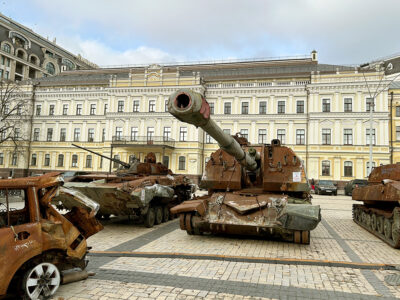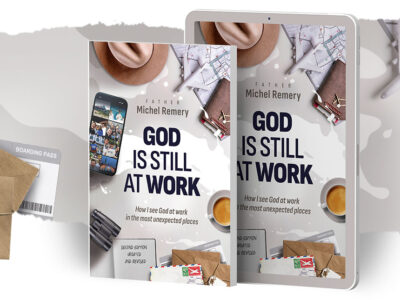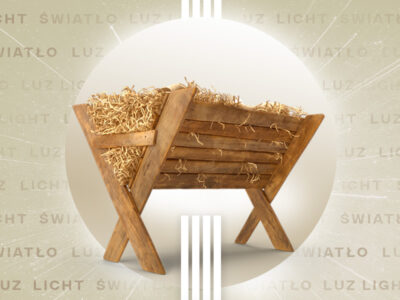Road works
Second Sunday of Advent: 5 December 2021
Bible texts: Baruch 5:1-9 | Psalm 126:1-2,2-3,4-5,6 | Philippians 1:4-6,8-11 | Luke 3:1-6
Get ready
The Old and New Testament together announce the coming of our Saviour, Jesus Christ. The readings of the second Sunday of Advent impress on us the need to prepare ourselves for the moment we will stand in his presence. John the Baptist takes up the Old Testament promise of salvation and announces the coming of Jesus (Lk 3:1-6). His task was prepared by the endless preaching of prophets like Baruch (Bar 5:1-9).
Get dressed
In the words of Baruch, the city of Jerusalem is given human-like features as it is called to ‘take off the garment of sorrow’ and ‘put on the robe of righteousness’ (Bar 5:1-2). In the Bible, Jerusalem is the ideal dwelling place, the city of God. As such, it also is an image of our future dwelling with God in heaven, the heavenly Jerusalem. The earthly Jerusalem is a concrete city where the people of Israel were living happily until they were scattered into exile by their enemies. Baruch writes at a time when the people have been dragged into exile by the occupants of Jerusalem.
Clothes make the (wo)man
Earlier in his Bible book, Baruch said that Jerusalem was as a mother mourning for her exiled children. That is why she put on her mourning gown, her ‘garment of sorrow’. Clothing expresses the status of the wearer: simple gowns for a mourner, beautiful clothes for a person of standing… In the Old Testament, Joseph was stripped of the robe which marked him as his father’s favourite (Gen 37:3.23) and received fine gowns to signify him as Pharaoh’s councillor (Gen 41:42). In the New Testament, the prodigal son was clothed in the finest robe by his father when he turned away from his sinful lifestyle (Lk 15:22).
Road repairs
The reason that Jerusalem needs a new dress is that things are about to change for its people. Finally, the prophet announces a message of hope! An end to the exile is announced: the people of Israel will be brought together into Jerusalem once more. They were led out on foot by the enemy but will return like royals on thrones (Bar 5:6). Have you ever noted how in some countries the roads to the airport are well maintained, even though other roads may be in dire need of repair? Locals will often tell you that this work was done to welcome an important visitor to the country. Similarly, in the old days, people were used to clean and repair the roads once they received word that the king was to visit them. Individuals on foot can navigate around all kinds of obstacles on a badly maintained road, but for a group of servants to carry royals on thrones in a dignified way you need good roads.
Prepare the way of the Lord
In the wilderness there is no easy going. No path is fully straight, there are rocks, mountains, woods and valleys to cross. And now it is announced in that same wilderness: ‘Prepare the way of the Lord, make his paths straight’ (Lk 3:4). The last of the prophets, John the Baptist, announces that our final King, the Lord is coming. More than for any king we need to prepare the roads for his coming. In this Advent season, we are called to join in the building of a road that will lead us to God! The people of Israel often saw their oppressor as the problem that obstructed their path to God. But the message of John the Baptist is that you should first look at your own conduct, which can be an even greater obstacle!
Mountains and valleys
Often, our lives are a wilderness, where there is no easy going, with lots of ups and downs, with mountains and valleys. In the Bible, mountains and hills are often a sign of arrogance and resistance to God (Isa 2:11-15), just as are tall trees (Isa 10:33-34). Valleys are associated with sin and death (2 Chr 28:3). Note that this is not the only way to look at these places. For example, elsewhere in the Bible, mountains are a particular place for meeting God (Ex 19:3). At his second coming, Christ will stand on a mountain (Zech 14:4). However, in the appeal of John the Baptist, the mountains and hills need to be smoothed out to create a path to God. Just like roadworks usually involve displacing a lot of ground, also the call to action by John will demand work from your side.
How?
If you are serious in your desire to prepare the way of the Lord, there is some work to be done. This begins with an honest examination of your own conduct and continues with the testimony of your life.
Turn away from sin
When Jerusalem is addressed in the Bible, usually God is speaking to us too. Earlier, we saw what it means to be righteous[>Blog 1]. We read that Jerusalem is called to ‘put on the robe of the righteousness that comes from God’ (Bar 5:2). In order to do so, John the Baptist calls us to ‘repent’, to turn away from sin and receive God’s forgiveness for what we did wrong. This forgiveness is received at the moment of our baptism (Lk 3:3). For whatever we did wrong since that moment, we have been given the sacrament of reconciliation. This sacrament can greatly help you when preparing the way of the Lord during this Advent season. Just go to a priest and let him lead you through the steps. There is no need to postpone it!
Announce the Gospel to everyone
John announces the hopeful message of the arrival of the ‘King of Kings’ (Rev 17:14). Jesus is our Saviour; he will help us overcome the obstacles of the mountains of pride and valleys of sin in our life. This hopeful message is addressed to every human being: ‘All flesh shall see the salvation of God’ (Lk 3:6). We are all called to be witnesses of the Gospel, first of all through our lifestyle. It is good to keep learning about the faith, for at times we are also asked to speak about our love for God with knowledge and insight (Phil 1:9). All the baptised are called to join in the mission of the Church to announce the Gospel to everyone, starting with your own testimony: ‘The Lord has done great things for us’ (Ps 126:3). The Advent season is a great time to rediscover your vocation to do this. How can you do so in your life right now?




